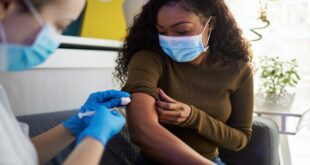At the University of Pennsylvania Medical School, Drew Weissman and Katalin Karikó (known as Kati) met by chance at a copy machine in 1998. And though he was admittedly a quiet guy who stuck to himself, they started talking. “We both used to copy a lot of articles to read,” he said.
He was an immunologist studying cells that adapt to mount immune responses against diseases; she was a biochemist working with messenger RNA (known as mRNA), the molecule that teaches cells how to make proteins. “We learned from each other,” said Karikó.
“I joke it’s like the Reese’s commercial where the chocolate and the peanut butter come together and make a new treat,” Weissman said.
And what makes a good scientific team? “Respect each other, listen to each other,” Karikó said. “We didn’t try to overpower each other.”
CBS News
Their collaboration led to the Pfizer and Moderna COVID vaccines in 2020. That year, the virus had spread worldwide, leading to global lockdowns and killing millions. Weissman said, “I knew the minute I heard about it, it’s a virus, it’s a respiratory infection. I knew the vaccine was gonna work.”
They never stopped working during lockdown. “Day and night, different shifts, minimizing the presence of people in one room,” said Karikó.
The mRNA COVID vaccine uses messenger RNA to direct the cells to create a spike protein, like the one on the surface of the virus, so the body builds defenses against that protein. This protection helps fight the virus.
The vaccine became available in the United States in December 2020. That month Weissman and Karikó were vaccinated, with a flourish. “They put up some cameras and took pictures and had fun,” Weissman said.
University of Pennsylvania
The COVID vaccine reduced the death toll and helped people get back to relatively normal lives.
Asked whether he was disappointed that the vaccine hasn’t put an end to COVID once and for all, Weissman replied, “In the beginning of the pandemic, I would go into the intensive care units, and every bed would have a COVID patient on a ventilator, doing poorly. And now, when I went into the intensive care units, there were no COVID patients at all. And that’s because of the vaccine.”
Their work will be used in the battle against some of the world’s most difficult diseases. “It’s truly phenomenal,” Weissman said. “Right now there’s 250 Phase I clinical trials of RNA vaccines. People are making vaccines for HIV, for malaria, for hepatitis C, for TB, for food allergies. Talk to a parent with a kid with a peanut allergy, and every day is a panic.”
The COVID vaccines were backed by government mandates, and sparked an uproar. “The controversy, I still don’t understand people thinking that science and vaccines are out to ‘get’ them,” said Weissman. “I’ve never heard of such a thing before.”
“Maybe it’s just what happens when politics collides with medicine?” asked Sanneh.
“That’s not the job of our politicians,” Weissman said. “They’re not supposed to tell people how to live less well, or how to die from diseases. They’re supposed to help the world.”
This past December, three years after the vaccine was released, the Nobel Prize committee awarded Karikó and Weissman its 18 carat gold medallion.
JONATHAN NACKSTRAND/AFP via Getty Images
Karikó said becoming a Nobel laureate still hasn’t sunk in: “It’s still happening. It takes time.”
Weissman said that the point when the Phase III clinical trials proved the vaccines were 95% effective was when he saw his life’s work had turned into something useful.
Did he take a moment to celebrate? “Nah, I’m not much of a celebrator,” he said. “I just probably went back to work.”
“Same with me,” Karikó said. “I ate a whole bag of chocolate-covered peanuts.”
Weissman’s rise might have seemed predictable (“My parents, when I was maybe five, they were brought in on a tour of the Nobel auditorium, and at one point, they walked up to a pair of seats and said, ‘Reserve these for us'”). Karikó’s did not. Born in communist Hungary, Karikó never knew a scientist, but she knew she wanted to be one.
In 1985, then-30-year-old Kati Karikó, along with her husband and young daughter, left Hungary for a job in a lab in Pennsylvania. Also along for the trip: her daughter’s teddy bear, which helped the family start their new life in America. Karikó had sewn the equivalent of $1,000 in British pounds inside the bear. “Because in Hungary, we were not allowed to take any money out of the country,” she said.
CBS News
Since then, Katalin Karikó and Drew Weissman have spent decades doing what both truly love.
“A laboratory is a wonderful place,” she said. “Kind of my home is a laboratory.”
Would she rather be in the lab doing her work than talking to journalists? “Yeah, partially it is true,” she laughed. “But also we realize that it is important to go out and educate the public and explain what we are doing, and inspire the next generation of scientists.”
“Exactly,” said Weissman. “I’m much happier – and nothing personal! – I’m still happier sitting in my office or in my lab working. That’s my favorite place.”
Sanneh said, “As a member of the human race, I’m glad to have you working in your lab!”
For more info:
Story produced by Mary Raffalli. Editor: Ed Givnish.

 Latest Breaking News Online News Portal
Latest Breaking News Online News Portal








